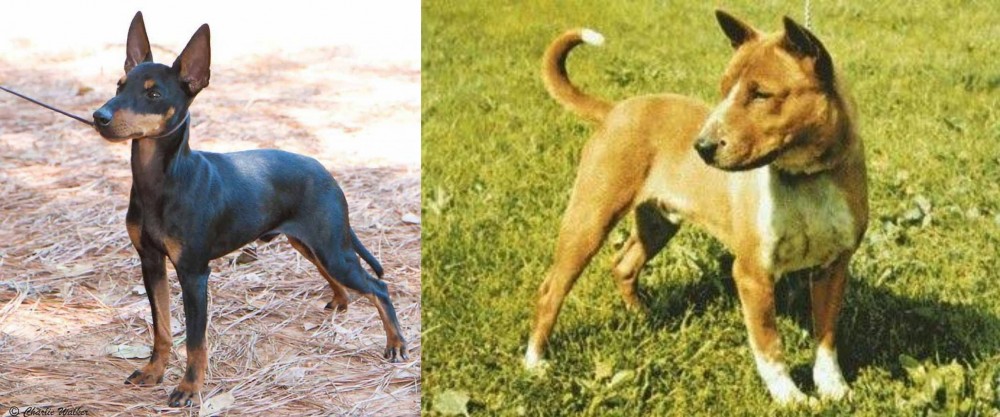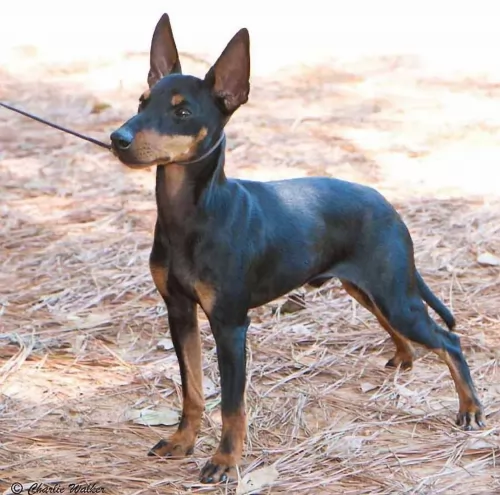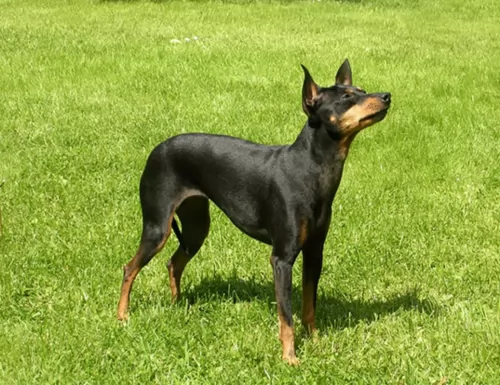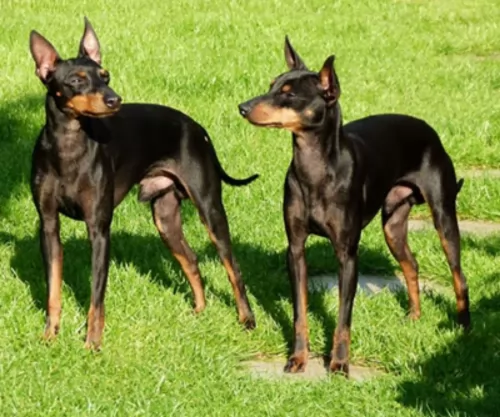 Petzlover
Petzlover English Toy Terrier (Black & Tan) is originated from United Kingdom but Telomian is originated from Malaysia. English Toy Terrier (Black & Tan) may grow 13 cm / 5 inches shorter than Telomian. English Toy Terrier (Black & Tan) may weigh 9 kg / 19 pounds lesser than Telomian. Both English Toy Terrier (Black & Tan) and Telomian has almost same life span. Both English Toy Terrier (Black & Tan) and Telomian has almost same litter size. Both English Toy Terrier (Black & Tan) and Telomian requires Moderate Maintenance.
English Toy Terrier (Black & Tan) is originated from United Kingdom but Telomian is originated from Malaysia. English Toy Terrier (Black & Tan) may grow 13 cm / 5 inches shorter than Telomian. English Toy Terrier (Black & Tan) may weigh 9 kg / 19 pounds lesser than Telomian. Both English Toy Terrier (Black & Tan) and Telomian has almost same life span. Both English Toy Terrier (Black & Tan) and Telomian has almost same litter size. Both English Toy Terrier (Black & Tan) and Telomian requires Moderate Maintenance.
 They English Toy Terrier (Black & Tan) is closely related to the Manchester Terrier and the Old English Black and Tan Terrier. The English Toy Terrier was developed to entertain humans in the rat pit due to its speed and agility. This is a sport that was very popular in English cities during Victorian times. Terriers went into the pits with a large number of rats and the winner would be the dog that killed a certain number of rats the fastest. The watchers would take bets on their favorite dog.
They English Toy Terrier (Black & Tan) is closely related to the Manchester Terrier and the Old English Black and Tan Terrier. The English Toy Terrier was developed to entertain humans in the rat pit due to its speed and agility. This is a sport that was very popular in English cities during Victorian times. Terriers went into the pits with a large number of rats and the winner would be the dog that killed a certain number of rats the fastest. The watchers would take bets on their favorite dog.
The English Toy Terrier was developed to be smaller than the Manchester Terrier, because smaller dogs were desired for the pit. In 1848 a small 2.5 kg black and tan terrier took less than an hour to kill 300 rats. When the Kennel Club was formed the sport of rat killing was outlawed. Because it was such a good looking dog, the black and tan was soon excelling in the show ring. To begin with there was one breed of Black and Tan Terriers and two weight classes. In 1920, the two were divided into separate breeds – the Manchester Terrier and the Black and Tan Terrier. It wasn’t until 1962 that the name changed to the English Toy Terrier (Black and Tan).In 1959, the declining numbers of Manchester Terriers caused the AKC to combine them again into one breed with two kinds: Toy and Standard.
Today the English Toy Terrier is one of the most vulnerable of the native breeds and efforts are in place to increase the gene pool and popularity of the dog. The UKC has also re-registered the English Toy Terrier (Black and Tan) in the stud book if it is a certified Toy. The breed is not AKC recognized.
 The Telomian, out of Malaysia is rare and the only dog bred in Malaysia that lives outside the country. The breed was originally called Village dog or Anjing Kampung in Malay. The Telo is still considered one of the rarest dogs in the world. They are considered as a possible missing link between the Australian Dingo and the African Basenji.
The Telomian, out of Malaysia is rare and the only dog bred in Malaysia that lives outside the country. The breed was originally called Village dog or Anjing Kampung in Malay. The Telo is still considered one of the rarest dogs in the world. They are considered as a possible missing link between the Australian Dingo and the African Basenji.
They were bred to kill vermin by indigenous people, the Orang Asli of Malasia. They have an amazing ability to climb bred into them because these indigenous people lived in stilt houses. Even as they kept the Theomian to hunt vermian, the Orang Asli believed dogs were evil spirits who would eventually turn on them.
In 1963, Dr. Orville Elliot, an anthropologist from the West, discovered the breed and named them the Telomian for the Telom River they lived near. He took a pair to the United States and by 1970 there was a Telomian Dog Club in the U.S. By 1973 another pair had been imported and it is thought that all the Telomians who live in the United States today are descendants of these two pairs.
Like the New Guinea Singing Dog and the Basenji, the Telo do not bark but rather have a unique howl. Being bred from wild dogs, the Telo is not fully domesticate and puppies need a lot of socialization. The Telomian is on the Dog Registry of America Inc and America’s Pet Registry but is not recognized by any pedigree registry.
 The English Toy Terrier is a small compact breed that resembles the Miniature Pinscher and the Manchester Terrier. The English Toy Terrier has a narrow but long head with a black nose, wedge muzzle and dark, almond shaped eyes. The ears are flame shaped and the chest is deep and narrow. He has thick legs and a tapered tail. The breed is of course black and tan – with the tan on the face, chest and legs.
The English Toy Terrier is a small compact breed that resembles the Miniature Pinscher and the Manchester Terrier. The English Toy Terrier has a narrow but long head with a black nose, wedge muzzle and dark, almond shaped eyes. The ears are flame shaped and the chest is deep and narrow. He has thick legs and a tapered tail. The breed is of course black and tan – with the tan on the face, chest and legs.
 This is a somewhat unique looking breed. They are small dogs, sturdy, athletic dogs with short coat, a square body and a long back. Their coat is smooth and sable and the ticking is white. They often have black masks and purple tongues. They are about 15-18 inches in height and weigh about 18-28 pounds. Their head is well proportioned and they have erect ears, almond shaped eyes and deep chests.
This is a somewhat unique looking breed. They are small dogs, sturdy, athletic dogs with short coat, a square body and a long back. Their coat is smooth and sable and the ticking is white. They often have black masks and purple tongues. They are about 15-18 inches in height and weigh about 18-28 pounds. Their head is well proportioned and they have erect ears, almond shaped eyes and deep chests.
The Telo is still so undomesticated that the female only comes into estrus once a year in September to October. They have great command of their paws and can use them more like cats or racoons. They climb with them and hold toys, objects or food in them. This is related to their need to climb since homes were built on stilts in the jungles of Malaysia.
 The English Toy Terrier is a stubborn, strong willed little dog. It has a fearless disposition and its alertness make it a great candidate for a guard dog despite its size. They will chase small animals due to their innate prey drive. They are affectionate and loyal and need to be with people. They love to be cuddled and petted, but usually choose one person that they become very close to. He is more than a lap dog. He can be playful, or he can be a small working dog.
The English Toy Terrier is a stubborn, strong willed little dog. It has a fearless disposition and its alertness make it a great candidate for a guard dog despite its size. They will chase small animals due to their innate prey drive. They are affectionate and loyal and need to be with people. They love to be cuddled and petted, but usually choose one person that they become very close to. He is more than a lap dog. He can be playful, or he can be a small working dog.
 2.Special talents – climbing ability, use of their paws, able to hunt their own food.
2.Special talents – climbing ability, use of their paws, able to hunt their own food.
3.Adaptability – they are not big so you would think apartment living would be ok but because of their energy and prey drive they really need a place to run.
 Like many Toy dogs, the English Toy Terrier is susceptible to:
Like many Toy dogs, the English Toy Terrier is susceptible to:
Dislocated kneecap – many small breeds are susceptible to this.
There has been a congenital line of deafness in the English Toy Terrier since it was developed with a cross from the English White Terrier. Unfortunately, some still breed these deaf dogs and continue to pass on the condition.
More painful than in the human eye, pressure builds up behind the eye ball. Dogs build up more pressure than humans and this can lead to blindness.
 This is a somewhat unique looking breed. They are small dogs, sturdy, athletic dogs with short coat, a square body and a long back. Their coat is smooth and sable and the ticking is white. They often have black masks and purple tongues. They are about 15-18 inches in height and weigh about 18-28 pounds. Their head is well proportioned and they have erect ears, almond shaped eyes and deep chests.
This is a somewhat unique looking breed. They are small dogs, sturdy, athletic dogs with short coat, a square body and a long back. Their coat is smooth and sable and the ticking is white. They often have black masks and purple tongues. They are about 15-18 inches in height and weigh about 18-28 pounds. Their head is well proportioned and they have erect ears, almond shaped eyes and deep chests.
The Telo is still so undomesticated that the female only comes into estrus once a year in September to October. They have great command of their paws and can use them more like cats or racoons. They climb with them and hold toys, objects or food in them. This is related to their need to climb since homes were built on stilts in the jungles of Malaysia.
 As a high energy small dog feed a high quality dry food that is designed specifically for small dogs. Feed about ¼ of a cup of food split into 2 meals.
As a high energy small dog feed a high quality dry food that is designed specifically for small dogs. Feed about ¼ of a cup of food split into 2 meals.
In addition to the health issues mentioned above:
This is an inherited blood disease in which a lack of protein has a negative effect of the platelets. This causes them not to form clots and so the dog has a bleeding issue.
Degeneration of the femur ball joint due to a blood deficiency issue. This can lead to arthritis.
Affects the lens by blocking the drainage from the eye creating a glaucoma like pressure.
The English Toy Terrier can develop skin issues so watch him closely.
The English Toy Terrier can be very energetic but that doesn’t actually mean she needs a ton of exercise. Because she is small she does not need as much as you might think. A half hour walk once a day is enough or just letting her run in your fenced yard.
He is an intelligent little dog who needs mental stimulation as much if not more than the solution. Play games like catch, hide and seek, frisbee, and performing tricks.
 This is an isolated, rare breed with very few known genetic health issues. They tend to be very healthy and athletic if well cared for and fed properly. The only issues they are known to have throughout the breed are hip and elbow dysplasia. Both of these issues we know can lead to arthritis and or lameness. Individual dogs may face other challenges such as allergies and obesity, but as a breed they are extremely healthy, much as the dingo and other wild dogs remain healthy.
This is an isolated, rare breed with very few known genetic health issues. They tend to be very healthy and athletic if well cared for and fed properly. The only issues they are known to have throughout the breed are hip and elbow dysplasia. Both of these issues we know can lead to arthritis and or lameness. Individual dogs may face other challenges such as allergies and obesity, but as a breed they are extremely healthy, much as the dingo and other wild dogs remain healthy.
Don’t overfeed them and watch what they might eat or try to eat when outside. They are used to feeding themselves in the wild and the domesticated dogs retain that prey drive and desire to eat what they catch.